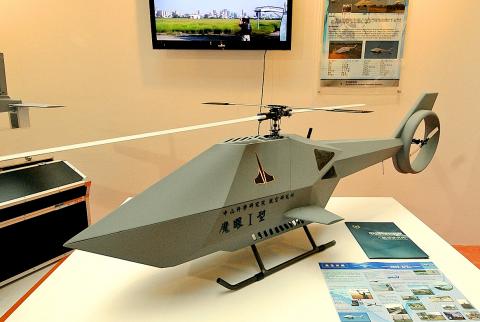The military said it is able to effectively detect military deployments in China through the use of unmanned aerial vehicles (UAVs), after it expanded detection zones from airspace over eastern and southern Taiwan to airspace over the Taiwan Strait.
According to a military official, who wished to remain anonymous, the US has expressed concern over how the UAV project has developed and military missions the drones are commissioned to perform.
The US has demanded that the Ministry of National Defense send specialists to brief the US Department of Defense on the project before a delegation was to head to the US for a meeting about bilateral cooperation on military issues involving high-level officials from both countries, the military official said.

Photo: Fang Pin-chao, Taipei Times
A UAV launched from a base in western Taiwan would be able to detect military movement in China’s southeast coastal area, he said.
Given Taiwan’s proximity to China, the capability of the UAVs to detect military deployments on the other side of the Taiwan Strait is highly valued by the US, he said.
Despite the US having sophisticated UAVs that can fly long distances to access the area, there are concerns within the US military that such missions would be costly, as well as there being political and military issues preventing its use of UAVs in the area, he added.
The UAV development program was undertaken by the National Chungshan Institute of Science and Technology. It has delivered 32 UAVs to the army.
In addition to Taimali (太麻里) in Taitung County, where the UAVs are based and training exercises are carried out, the ministry has been in talks with the Civil Aeronautics Administration over the possibility that part of the Hengchun airport in Pingtung could be used as another training base for the drones.
According to sources from the military, the air force’s airspace training area is within the range of missiles deployed in southeast China, making it impossible for the air force to carry out missions in the areas that the UAVs can access.
The military said it was still deliberating whether it would deploy the UAVs in western Taiwan.

CHAOS: Iranians took to the streets playing celebratory music after reports of Khamenei’s death on Saturday, while mourners also gathered in Tehran yesterday Iranian Supreme Leader Ayatollah Ali Khamenei was killed in a major attack on Iran launched by Israel and the US, throwing the future of the Islamic republic into doubt and raising the risk of regional instability. Iranian state television and the state-run IRNA news agency announced the 86-year-old’s death early yesterday. US President Donald Trump said it gave Iranians their “greatest chance” to “take back” their country. The announcements came after a joint US and Israeli aerial bombardment that targeted Iranian military and governmental sites. Trump said the “heavy and pinpoint bombing” would continue through the week or as long

TRUST: The KMT said it respected the US’ timing and considerations, and hoped it would continue to honor its commitments to helping Taiwan bolster its defenses and deterrence US President Donald Trump is delaying a multibillion-dollar arms sale to Taiwan to ensure his visit to Beijing is successful, a New York Times report said. The weapons sales package has stalled in the US Department of State, the report said, citing US officials it did not identify. The White House has told agencies not to push forward ahead of Trump’s meeting with Chinese President Xi Jinping (習近平), it said. The two last month held a phone call to discuss trade and geopolitical flashpoints ahead of the summit. Xi raised the Taiwan issue and urged the US to handle arms sales to

State-run CPC Corp, Taiwan (CPC, 台灣中油) yesterday said that it had confirmed on Saturday night with its liquefied natural gas (LNG) and crude oil suppliers that shipments are proceeding as scheduled and that domestic supplies remain unaffected. The CPC yesterday announced the gasoline and diesel prices will rise by NT$0.2 and NT$0.4 per liter, respectively, starting Monday, citing Middle East tensions and blizzards in the eastern United States. CPC also iterated it has been reducing the proportion of crude oil imports from the Middle East and diversifying its supply sources in the past few years in response to geopolitical risks, expanding

Pro-democracy media tycoon Jimmy Lai’s (黎智英) fraud conviction and prison sentence were yesterday overturned by a Hong Kong court, in a surprise legal decision that comes soon after Lai was jailed for 20 years on a separate national security charge. Judges Jeremy Poon (潘兆初), Anthea Pang (彭寶琴) and Derek Pang (彭偉昌) said in the judgement that they allowed the appeal from Lai, and another defendant in the case, to proceed, as a lower court judge had “erred.” “The Court of Appeal gave them leave to appeal against their conviction, allowed their appeals, quashed the convictions and set aside the sentences,” the judges